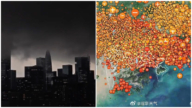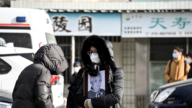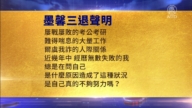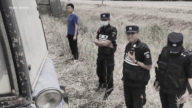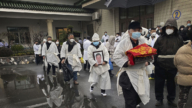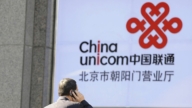【新唐人2014年01月14日訊】日前,有媒體人向外界披露,公益團體「公盟」被定為「反黨集團」被治罪,而引起各界嘩然。反黨集團在中共毛澤東時代常常被用來給不同的中國人定罪,上至中共自身的高官領導者,下至普普通通百姓。法律人士認為,在法律上從來沒有「反黨集團」這個名詞,也沒有反黨這個罪名。那麼中共當局為甚麼如今又把這個「反黨集團」從新翻出來?請看專家的分析。
大陸資深媒體人高瑜日前向海外媒體披露,北京當局已經決定要把中國公益組織「公盟諮詢公司」定為反黨集團,「公盟」發起人許志永、及「公盟」贊助商人王功權,有可能被定重罪。
大陸資深媒體人高瑜:「這個是任志強傳達的。就是任志強年前要有一個企業家會,被上級找去了,傳達了就是這些。」
據了解,去年底,中國地產大亨任志強參加企業家聚會時,不少企業家對王功權被當局抓捕頗有不滿。他們原本準備下午聚會,沒想到上午就被中共政協主席俞正聲找去。
南京「東南大學」法學教授張讚寧表示:「公盟」不存在反對中國共產黨的問題。大不了是作為反對黨,反對黨是很正常的。
南京東南大學法學教授張讚寧:「公盟他只是履行了一個公民的權力、公民的職責,比如他們參加人大的競選、主張公民社會,這都是在憲法和法律的範圍內進行的活動,所以不應當以一個反黨集團把他們抓起來,這是毫無理由和沒有證據的。就是讓人民噤聲,把人民的嘴封住。」
「公盟」的前身是「陽光憲政研究中心」,2003年由中國法學學者許志永、滕彪、及俞江博士等人創建。「公盟」組織參與了大量推動社會公平正義的維權活動,包括迫使北京廢除收容遣返制度、傳播選舉等法律知識、呼籲取消流動人員的子女高考戶籍限制、和要求官員財產公示等。
高瑜:「就是進行公民運動嘛。一個是促進反腐,就是要領導人公布財產;再有一個就是提出教育平權。也沒有違反憲法。按照憲法35條,公民表達言論的自由,他們是在表達他們的政治觀點。」
高瑜表示,當今中共高層「思想非常陳舊」,思維還是中共那種階級鬥爭方式,只要堅持普世價值、民主憲政,就可能被定性反黨、反社會主義。
2010年第9期北京《炎黃春秋》雜誌,發表郭德宏的文章:中共歷史上「反黨集團」的結局。
文章提到,在中共各個歷史時期,曾經有無數人被打成大大小小的「反黨集團」。包括黨員、非黨員;包括幹部、群眾;也有中共中央和國家的高級領導人;還有20世紀20年代就入黨的老黨員;既有文化、教育界的人士,也有黨、政、軍、公安、政法等領域的人員等等。
郭德宏指出,1957年至1958年:中共打「反黨集團」進入高潮,「反黨集團」遍及全國;1959年至1965年:在「反右傾」等運動中繼續打了很多「反黨集團」;「文革」時期:打「反黨集團」進入第二個高潮。
郭德宏文中表示,具有諷刺意味的是,原來把無數人打成「反黨集團」的人,也被打成「反黨集團」。
張讚寧表示:反黨集團在毛澤東統治時代,被大規模的用來迫害人,「反黨集團」沒有一個定義,在法律上也沒有這個名詞,而法律上是沒有「反黨」這個罪名的。
張讚寧:「現在把公盟作為反黨集團來處理也是很奇怪的事情,公盟成立至今已經10年了,為甚麼突然在10年之後就發現他們是反黨集團?所以我認為這是一個欲加之罪。」
時事評論員任百鳴認為:中國大陸現在各地民怨四起,中共政權岌岌可危的情況下,中共最擔心和恐懼的事情,是它的執政合法性。
時事評論員任百鳴:「它一定要維護它黨的這種所謂權威,所以它把一些威脅的力量,或者是稍微它所認為的這些對它有威脅的力量,它定為反黨集團,一打成反黨集團以後,它在政治運作上一切方面它都會大開綠燈,也可以大開殺戒,這是它考慮的成分。」
任百鳴表示:中共的恐懼和擔心到了極點,所以各種各樣的手段和這種不可理喻的事情也就會相繼參合在一起發生,實際上也就是中共滅亡之前的徵兆。
採訪編輯/易如 後製/鍾元
Beijing Charges the Anti-Party Clique
Beijing has aroused public uproar for reportedly charging the
NGO Open Constitution Initiative with the crime of being an
“anti-Party group", a label used in the Mao era to convict
anyone from high ranking officials to average Chinese people.
Legal experts question the so-called anti-Party group charge
and its existence as a crime.
So, why is the regime exploiting this label now?
Senior journalist Gao Yu has revealed that Beijing has labeled
Open Constitution Initiative (OCI) as an anti-Party group.
The organizer Xu Zhiyong and the sponsor Wang Gongquan
will be facing heavy sentences.
Gao Yu, senior journalist: “Ren Zhiqiang delivered the message.
He was told before the New Year, during a party for entrepreneurs."
Real estate tycoon Ren Zhiqiang had participated in an
entrepreneurs’ party.
Many participants showed their discontent
over the arrest of Wang Gongquan.
They had planned another gathering for later that day.
But Ren Zhiqiang was summoned by the Political Consultative
Committee Chairman Yu Zhengsheng in the morning.
Law professor Zhang Zanning says that the OCI is not
about anti-Party. At most, it can be seen as a typical opponent.
Zhang Zanning, law professor, Southeast University:
“The OCI is only conducting the rights and duties of a citizen.
They participate in the National People’s Congress election,
advocate civil society, and its activities are
well within the scope of the Constitution and laws.
There is no reason to arrest them in the name of
being an anti-Party group.
The regime is silencing the people’s voices."
The Open Constitution Initiative or OCI, also known as
Gongmeng, was established in 2003 by Xu Zhiyong, Yu Jiang,
and Teng Biao from the Peking University Law School.
Among it’s many activities for social justice are demanding
Beijing to abolish the custody and repatriation regulation
for migrant workers, disseminating legal knowledge about
elections, calling for the abolition of child residency
restrictions during college entrance exams,
and requiring officials declare their property.
Gao Yu: “It is all about civic movements.
One is to promote anti-corruption by having the leadership
declare their property;
and another is about the affirmative action in education.
It is not unconstitutional.
According to Article 35 in China’s constitution, regarding
freedom of expression, they are expressing their political views."
Gao Yu says the regime leadership still has the struggle
philosophy of the Chinese Communist Party (CCP).
Any insistence on universal values or constitutional democracy
is labeled as anti-Party and anti-socialist.
In the ninth issue in 2010 of the Chinese magazine, YanHuang
ChunQiu, an article by Guo Dehong detailed the historical
tragedy of those who were labeled as the anti-Party by the CCP.
The article says that in the CCP’s history, the anti-Party label
has been used many times on Party members, general public,
non-Party members, cadres, central leaders and senior cadres,
including people in all fields such as cultural, education,
the Party, political, the army, public security, and so forth.
Guo Dehong noted that between 1957 and 1958, the CCP’s
campaign to remove the anti-Party groups hit a climax.
The campaign had continued in the anti- rightist movement
between 1959 and 1965.
Until the Cultural Revolution, the movement to clean out
anti-Party members had reached its second climax.
Guo Dehong says that those who had labeled millions of
people as part of the anti-party clique ironically also ended up
being labeled as part of the anti-party clique later on.
Zhang Zanning says that Mao Zedong exploited the
anti-Party clique label to conduct large-scale persecution.
However, the anti-Party clique label has no legal definition
and can’t even be found in dictionaries,
and there is no such crime in law.
Zhang Zanning: “It is bizarre to treat the OCI as anti-Party.
OCI has been established for 10 years.
Why is it suddenly labeled as against the Party 10 year later?
It is simply arbitrarily labeling."
Commentator Ren Baiming suspects that the CCP fears and
worries about the crisis of the regime’s failing legitimacy and
collapse under the current widespread discontent.
Ren Baiming, commentator: “To maintain its Party authority,
it must remove the threats.
Any slight threat will be labeled as anti-Party.
With the label, the political suppression becomes legitimate,
even killing becomes an acceptable means."
Ren Baiming says that CCP’s fear and worry have gone to the
extreme, so it employs many incomprehensible measures,
but this is in fact a sign before the demise of the CCP.
Interview & Edit/YiRu Post-Production/ZhongYuan


